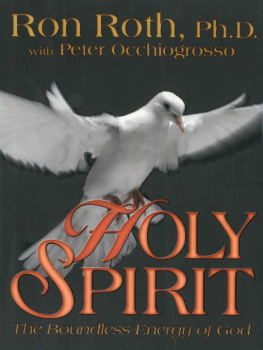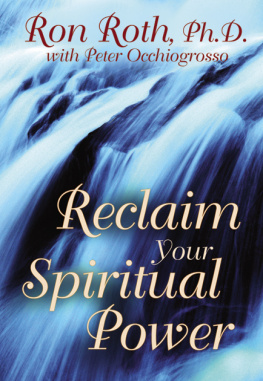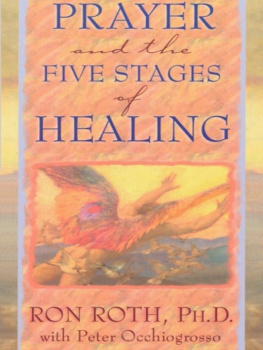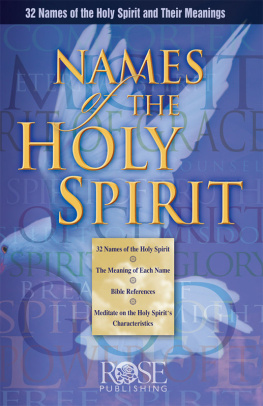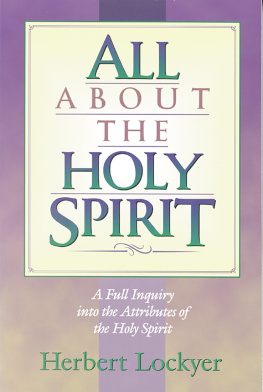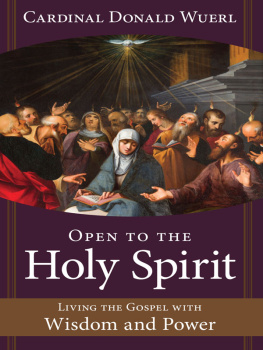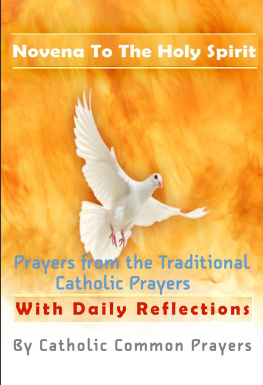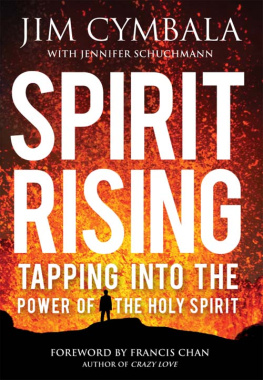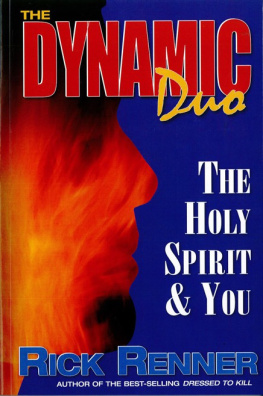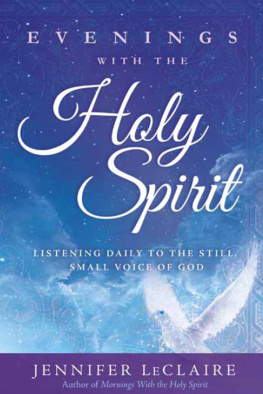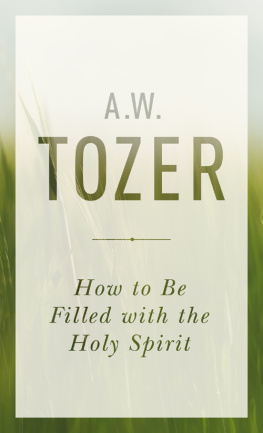
Holy Spirit

The Boundless Energy of God
Ron Roth, Ph.D.
with Peter Occhiogrosso

Hay House, Inc.
Carlsbad, California Sydney, Australia
Copyright 2000 by Ron Roth
Published and distributed in the United States by:
Hay House, Inc., RO. Box 5100, Carlsbad, CA 92018-5100
(800)654-5126 (800) 650-5115 (fax)
Editorial: Jill Kramer Design: Summer McStravick
All rights reserved. No part of this book may be reproduced by any mechanical, photographic, or electronic process, or in the form of a phonographic recording; nor may it be stored in a retrieval system, transmitted, or otherwise be copied for public or private use other than for fair use as brief quotations embodied in articles and reviews without prior written permission of the publisher.
Cataloging-in-Publication Data available
from the Library of Congress.
ISBN 1-56170-705-8
03 02 01 00 4 3 2 1
1st Printing, April 2000
Printed in the United States of America
Contents

I gratefully dedicate this book to my personal staff,
with deep appreciation for all that they do
through the use of their personal gifts, to assist me
in accomplishing my mission to make
known to the world the beauty, love, and
power of God's Holy Spirit.


Just to be aware of the workings of
the Holy Spirit in our lives will lead to
an awareness of our own limitlessness.
For are we not, at the core of our being,
spirit and an emanation of the Divine light?

Reinventing Christianity
W hen I say that the goal of all my work whether writing books or giving workshops and healing servicesis to reinvent Christianity, some people think this is either blasphemous or downright presumptuous. Who am I to reinvent the religion of our forefathers? And yet the truth is that people have been reinventing Christianity for the past 2,000 years, almost from the time it began.
Just think of the sacraments, to take the most obvious example. Among the earliest Christians, the major ritual consisted of gathering in home churches and sharing a meal that became known as the eucharist, from the Greek for giving thanks. Communion was almost certainly the first, and, for a time, the only sacrament in common celebration by the followers of Jesus. Baptism of new members into the community in memory of the baptism of Jesus by John the Baptist, public confession, the ordaining of clergy, last rites, the sanctification of weddings, and confirmation all followed suit. But in returning to scriptural roots during the Protestant Reformation, many reformers insisted that the only sacraments that actually took place in the Gospels were baptism, communion, and matrimony, and dropped the rest. Some dropped the very idea of sacraments altogether.
On an even more startling level, most modern biblical scholars agree that the first Christians, including Peter and Paul, expected Jesus to return in apocalyptic glory in their own day. That's probably one of the reasons why Paul had such a low regard for marriage. He didn't see any burning need to procreate if the Second Coming was just around the corner, and advocated marriage largely as a preventive measure against fornication. In various places in the scriptures, Peter makes repeated statements to the effect that Jesus will be returning soon, and the Letter of James (5:8) says, The coming of the Lord is very near If the Bible is the inerrant word of God, as so many fundamentalist Christians believe, how could Peter and Paul and James have misunderstood what would happen in the near future? Isn't it more likely that the first disciples' understanding of Jesus' message and intentions evolved over time, as happened with the followers of the Buddha before him and of Muhammad after him? Even the New Testament itself differs significantly in the Catholic and Protestant versionsthe former including a half-dozen books that are not recognized as canonical by Protestants.
We could just as easily examine the doctrine of priestly celibacy still adhered to so firmly by the Roman Catholic church. As we now know, Peter and most of the apostles were married, as were many of the early popes. Until about the 11th century, celibacy among the clergy was either optional or not stringently enforced. But as the church amassed more land, it sought to prevent it from being passed on to the offspring of its clergy, and so began enforcing celibacy for economic reasons. Despite protestations to the contrary, the church's insistence on priestly celibacy is unrelated to the demands of ministerial life as proven by the many thousands of Protestant, Orthodox Christian, Jewish, and Muslim clerics who have active ministries yet remain free to marry and raise families.
Continuing to more recent times, many elements of Catholic dogmaincluding the Assumption of Mary and papal infallibility were not even codified until the 19th century. The Vatican Council of the early 1960s radically realigned the roles of clergy and laity, and introduced reforms so disturbing to some (changing the language of the Mass from Latin to the vernacular, for instance) that many priests, nuns, and monks left the religious life.
Like all genuine spiritual paths, when Christianity first emerged, it was geared to the everyday life of people. It helped them answer the burning questions of their day and deal with practical issues, just as Jesus had done when he originally taught what eventually became known as the Gospels. Jesus spoke of the lilies of the field and the birds of the air, and used metaphors based on harvests, food and wine, and servants and masters. He was talking to an agricultural society, and they understood what he was saying. But as Christianity advanced in years and became more institutionalized, its concepts became theologically more sophisticated, yet dealt less and less with practical issues.
If Christianity has been reinvented for all these centuries by everyone from breakaway reformers to the very hierarchy of the church, doesn't that mean that those of us in the trenches have as much of a right to do so? All spiritual paths are continually being reinvented and brought back to earth, and that is what this book aims to doto return spiritual principles to their practical applications, stripped of their dogmatic baggage. Although I am a disciple and devotee of Jesus, I don't practice Christianity as it is presented today, especially in the fundamentalist version with its rigid beliefs and dogmatic practices, or in the rule-bound teachings of the Roman Catholic church. I prefer a path more in keeping with the Spirit of Jesus, which is the theme of this book. Part of my message is that you can follow the path of the Spirit of Jesus without becoming a member of any particular denomination.
What is of supreme importance is how the Spirit of Jesus manifests in each one of us. People talk frequently about the human spirit, yet I'm not so sure that there is such a thing. Rather, it is the Spirit of God appearing within us in various frequencies depending on our thought patterns. If that Spirit is not allowed to manifest in an appropriate format, it will seek to express itself any way it can. I sometimes think that when people get up and cheer their team uproariously at a sporting event, they are doing so because they are not permitted to express their joy in most religious gatherings. I believe that many people also go to taverns and get high in various ways or engage in high-risk sexual behavior out of a need to express pleasure that is not allowed to be expressed where it ought to be primarilyin religious or spiritual surroundings.
Next page
